These are the proceedings from the first Social Media for Learning in Higher Education (#SocMedHE15), they include: The peer review process: Journal Location: Open access Creative commons license : https://creativecommons.org/share-your-work/)
Publication information:
ISBN 978-1-84387-394-5
Social Media for Learning in Higher Education
2015 Conference proceedings (#SocMedHE15)
Publication date: 25 November 2016
All submissions for #SocMedHE15 were double blind peer reviewed. Full papers went through further a double blind peer review process.
The conference proceedings are currently located here on the main conference website. At some point, we anticipate that they will move to a permanent open journal home, managed centrally with other publications from Sheffield Hallam University. To bookmark, or refer to the proceedings please use the short URL: http://go.shu.ac.uk/socmedhe/proceedings, and we will update the destination page when this location change takes place.
The content is available via open access which means that all content is freely available without charge to the user or his/her institution. Users are allowed to read, download, copy, distribute, print, search, or link to the full text of the articles, or use them for any other lawful purposes, without asking prior permission from the publisher or the author. This is in accordance with the Budapest Open Access Initiative (http://www.budapestopenaccessinitiative.org/read) statement of open access.
#SocMedHE15 : “Finding Our Social Identity”
#SocMedHE15 took place on 18th December 2015. The overarching theme of the conference is the use of social media for learning in Higher Education. The conference was designed to create a forum for academics, their students, developers and strategic managers to consider the opportunities, challenges and the disruptive influence of social media for learning.
Full papers
Case Studies:
Dunn, L. (The University of Glasgow)
Social Media as a Professional Medium: an equilibrium of enthusiasm and protection for student teachers
Lumsden, P. (University of Central Lancashire)
Impact of a course blog on HE practice and development of learning communities
Honeychurch, S., Ahmed, S. (University of Glasgow)
Using social media to promote deep learning and increase student engagement
Ippolito, J., Larson,H., Malyn-Smith,J Ed.D. (Education Development Center, Inc)
Defining an Emerging Occupation: Who is the Social Technology Enabled Professional (STEP)?
Research articles:
Ugiagbe-Green, I. (Leeds Beckett University)
The role of technology as mediating tools in developing professional identity & competency of trainee accountants
Miller, S. (University of Huddersfield)
Shaping E-professional identities: Towards an understanding of the impact of social media experiences on the professional development of social work students
Connelly, L., Osborne, N. (University of Edinburgh, Scotland)
Student identities in transition: social media experiences, curation and implications for Higher Education
Hartley, A. S., Kassam, A.A (University of Bradford)
Social Networking for Learning in Higher Education: Capitalising on Social Capital
Harris, L., Molesworth, M (University of Southampton)
Engaging students and MOOC learners through social media
Purvis, A., Rodger, H.M. , Beckingham, S. (Sheffield Hallam University)
Experiences of Social Media in Higher Education: Barriers, Enablers and Next Steps
Abstracts for all papers, workshops & thunderstorm sessions
Workshops
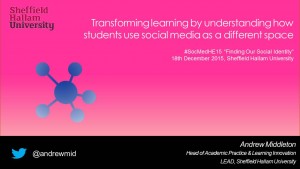 Transforming learning by understanding how students use social media as a different space
Transforming learning by understanding how students use social media as a different space
Andrew Middleton – Sheffield Hallam University @andrewmid
Social media establish a new space for learning that is neither owned by the learner nor provided by the institution. Lack of ownership presents a challenge for pedagogic design. We will explore this rich extended learning space by collectively developing a set of design principles derived from literature and experience.
Detailed description of workshop
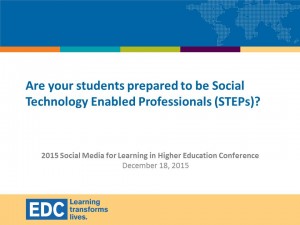 Are you preparing your students to be Social Technology Enabled Professionals (STEPs)?
Are you preparing your students to be Social Technology Enabled Professionals (STEPs)?
Joe Ippolito, Dr Joyce Malyn-Smith and Heidi Larson – Education Development Center, Inc. USA @SocialTechPro
Attendees will be introduced to materials created by a panel of U.S. social media experts that identify the work responsibilities of a Social Technology Enabled Professional (STEP) and provide guidance on measuring the performance of those responsibilities. The session will demonstrate how the materials can be used to build training curriculum.
Detailed description of workshop
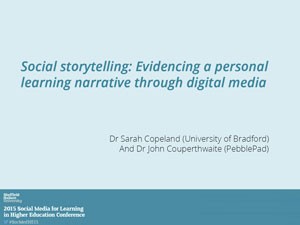 Social storytelling: Evidencing a personal learning narrative through digital media
Social storytelling: Evidencing a personal learning narrative through digital media
Dr Sarah Copeland @XarahC – University of Bradford and Dr John Couperthwaite @johncoup – PebblePad
We propose to invite participants to explore the relationship between sharing of narrative and gathering evidence as a social learning framework. We aim to facilitate workshop activities centred on portfolio-based learning, digital storytelling, and assessment through a connectivist learning model.
Detailed description of workshop
Developing and optimising your professional identity
Charles Hardy chardy@linkedin.com / @charleshardy – LinkedIn
This session will explore the role of social media in defining your “professional brand”, the key building blocks for a strong brand, and how it can play an influential role in marketing you (and your business / institution) as desirable to work with.
Detailed description of workshop
Copyright education in the age of social media
Chris Morrison @cbowiemorrison – University of Kent and Dr Jane Secker @jsecker – London School of Economics
This workshop draws on findings from a survey of copyright literacy levels amongst librarians and related professionals (Morrison & Secker, 2015). Participants will explore some of the challenges that social media presents and consider the best ways of supporting staff and students to use social media ethically and legally.
Detailed description of workshop
Social media – accessibility and inclusion, benefit or barrier?
Alistair McNaught @alistairm – Jisc
Social media opens up a range of new opportunities for disabled learners. It has inclusion benefits in encouraging collaboration, reflection, peer feedback etc. However, different social media have different accessibility issues so you can unwittingly create barriers for some whilst removing them for others. This workshop explores problems and solutions.
Detailed description of workshop
The HONY Model: Extending the journalism classroom using social media
Dr Chindu Sreedharan @Chindu – Bournemouth University and Dr Lada Price @jnl113 – University of Sheffield
This workshop aims to explore storytelling on social media as a way to enhance elementary journalism skills at the UG and PG levels. From a brief distributed earlier, and using the Human Of New York style of content creation as a model, participants will file stories for a live Facebook page and Tumblr site (www.tiwis.tumblr.com). We propose to hold a one-hour workshop on the conference day, which will be devoted to the deconstruction of the process of content creation, the artefacts, and the usefulness of the exercise for journalism education.
Detailed description of workshop
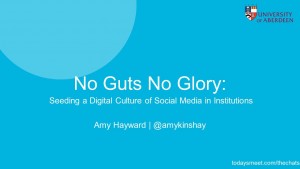 No Guts No Glory: Seeding a digital culture of social media in institutions
No Guts No Glory: Seeding a digital culture of social media in institutions
Amy Hayward @amykinshay – University of Aberdeen
Overcoming the challenges of infrastructure, policy, and guidance in an educational setting first require embedding a digital culture within an institution. This session will explore solutions to challenges, focusing on laying the foundations for frameworks in social media.
Detailed description of workshop
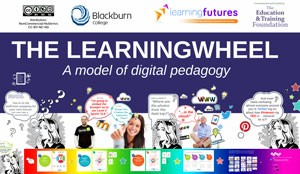 Collaborative Learning Wheels: Collaborative pedagogical development using social media crowd-sourcing
Collaborative Learning Wheels: Collaborative pedagogical development using social media crowd-sourcing
Deborah Miller @DebMillar24 – Blackburn College
Learning Wheels are a simple graphic device to help bridge the gap between traditional teaching methods and contemporary digital learning content and resources. They guide staff through digital technologies by linking platforms, apps and web content to learning delivery.The wheels are based on a developing pedagogy that takes into account four models of student engagement and three modes of delivery.
Detailed description of workshop
Applying critical digital literacy to social media practice
Juliet Hinrichsen @juliet_hin – Sheffield Hallam University and Antony Coombes – University of Greenwich
This workshop addresses two particular challenges:
1) raising awareness of and mitigating reputational and other risks
2) facilitating and developing a theorised, tested approach to developing the practice of academic staff.
Participation in the workshop will enable delegates to use the tools demonstrated, acting as facilitators with various stakeholder groups in their own institutions.
Detailed description of workshop
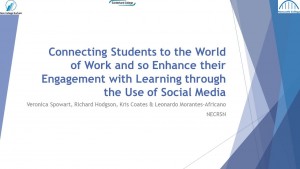 Connecting students to the world of work and so enhance their engagement with learning through the use of social media
Connecting students to the world of work and so enhance their engagement with learning through the use of social media
Veronica Spowart, Kris Coats and Leo Morantes-Africano – New College Durham
To provide a detailed plan to improve student engagement through the use of social media. With the objectives of:
– Safely set up social media for student group use
– Initiate and improve student confidence using social media with external dimensions
– Getting alumni and employer buy-in
Providing inspired engagement through interaction with alumni and employers.
Detailed description of workshop
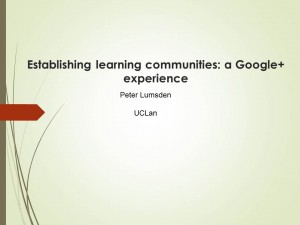 Establishing Learning Communities: A Google+ Experience
Establishing Learning Communities: A Google+ Experience
Peter Lumsden @PLumsden, Karl Lester @karlrlester and Mark Wallwork – University of Central Lancashire
Illustrate benefits and challenges of using Google+ as a platform for discussion activities. Give an analysis of its usage by students in three different settings at UCLan; patterns of usage, effectiveness in forming learning communities; provide hands-on experience of using Google+ as part of a learning community.
Detailed description of workshop
Karl Lester’s presentation | Mark Wallwork’s presentation
How learners on an English Literature MOOC prompted academics to engage in social media in a way they never had before
Layla Croll @LaylaYAY and Dr Adam Smith @elementaladam – University of Sheffield
Discover how The University of Sheffield School of English used social media to respond to an active community of learners, crowd sourcing additional material to expand and enrich the learning experience.
Detailed description of short paper
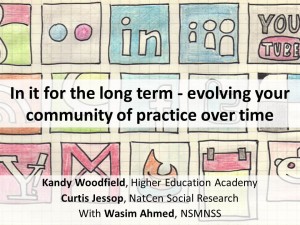 In it for the long term – evolving your community of practice over time: learning from the New Social Media, New Social Science network (#NSMNSS)
In it for the long term – evolving your community of practice over time: learning from the New Social Media, New Social Science network (#NSMNSS)
Kandy Woodfield @jess1ecat and Curtis Jessop @CurtisJessop – Higher Education Academy
An interactive session during which you can learn how to keep your online community of practice energised over time and consider ways to avoid potential pitfalls. We’ll draw on your own experiences and those of our #NSMNSS network to co-create a set of top tips for community resilience. We’ll provide guidance and resource links for building, nurturing and sustaining your online learning communities.
Detailed description of workshop
From High Noon to Midnight: social media in HE: should universities provide advice or allow open evolution of social media in teaching?
Hilary Cunliffe-Charlesworth @hilary_cunliffe and Chris Hall @goldblach – Sheffield Hallam University
While the use of social media in the HE is encouraged to what extent does a university communications strategy constrain or a signpost the continuum of change and ethical considerations?
Detailed description of workshop
Short Papers
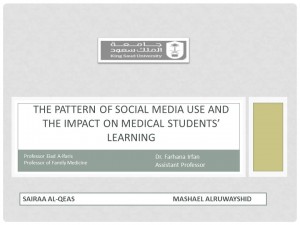 The pattern of social media use and the impact of medical students’ learning
The pattern of social media use and the impact of medical students’ learning
Sairaa Saeed AlQeas Alqahtani @SairaaO_o and Mashael ALRowaished @Mashail_R – King Saud University, College of Medicine, Riyadh
Social media (SM) is everywhere in the society and its usage is expanding at a fast pace all around the world, especially among the students. However, little is known about how much, why and how medical students use SM and the way it affects their learning.
This study aimed to determine whether there is an association between SM use and academic grades and to assess the pattern, extent and reasons of its use among medical students.
Detailed description of short paper
Experiences of social media in higher education: Barriers, enablers and next steps
Alison Purvis @DrAlisonPurvis, Helen Rodger @HelenRodgerSHU and Sue Beckingham @suebecks – Sheffield Hallam University
The focus of this study investigates current institutional practice of the use of social media to support and enhance learning.
Our short paper shares survey findings; highlighting both enablers and barriers for what is for many, still considered innovative practice where peers are calling for guided support.
Detailed description of short paper
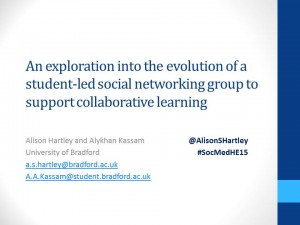 Can social media foster our learning? We are doing it anyway, even without your help! An exploration into the evolution of a student-led social networking group to support collaborative learning
Can social media foster our learning? We are doing it anyway, even without your help! An exploration into the evolution of a student-led social networking group to support collaborative learning
Alison Hartley @AlisonSHartley – University of Bradford
Hear what learners themselves are saying about the pedagogic possibilities of social media from a bottom-up, student-led approach to collaborative learning.
How and why does such a community evolve? Is it influenced by their classroom experiences? How can this impact on our own educational practices within these shifting pedagogies?
Detailed description of short paper
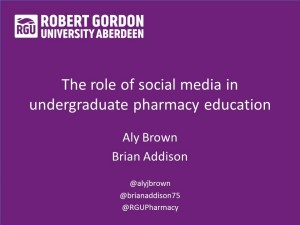 The role of social media in undergraduate pharmacy education
The role of social media in undergraduate pharmacy education
Alyson Brown @alyjbrown and Brian Addison @BrianAddison75 – Robert Gordon University
Aim: to explore how undergraduate pharmacy students define and use social media to support their education
Outcome: potential for using social media to support learning was recognised; concerns raised about the implications as future pharmacy professionals
Key focus: widespread use of social media amongst undergraduate pharmacy students but awareness of the potential implications of their online behaviour shaped its use
Detailed description of short paper
Audio recording of presentation
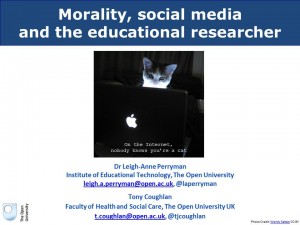 Morality, social media and the educational researcher
Morality, social media and the educational researcher
Leigh-Anne Perryman @laperryman and Tony Coughlan @tjcoughlan – The Open University
Educational research in social media spaces involves moral dilemmas often absent from traditional ethical guidelines. For example, the public/private distinction can be blurred, individuals can be prone to confessional activity, and informed consent can be difficult to obtain. Here, we discuss how the responsible researcher might manage such challenges.
Detailed description of short paper
Audio recording of session
 Using Facebook groups to promote deep learning and increase student engagement in the College of Science & Engineering
Using Facebook groups to promote deep learning and increase student engagement in the College of Science & Engineering
Sarah Honeychurch and Shazia Ahmed @ShaziaAhmed – University of Glasgow
Five years ago Facebook groups were set up for Level 1 Mathematics and Computing students as an alternative to Peer Assisted Learning sessions. Due to their success more have been introduced and we now have subject groups for the whole College of Science and Engineering.
Detailed description of short paper
Audio recording of presentation
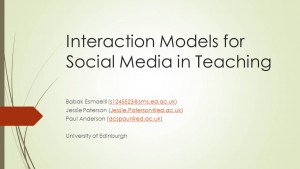 Interaction models for social media in teaching
Interaction models for social media in teaching
Babak Esmaeili – University of Edinburgh
Effective pedagogic use of social media often requires the ability to locate tools which support a particular type of interaction. We discuss our attempts to identify and formalise these types of interaction, and show how this can be used to aid (and perhaps automate) the selection of appropriate tools.
Detailed description of short paper
Audio recording of presentation
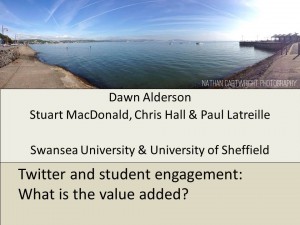 Twitter and student engagement: What is the value added?
Twitter and student engagement: What is the value added?
Dawn Alderson – Swansea University
This session refers to qualitative research about third year undergraduates’ use of Twitter during lectures; with a focus on student engagement, specifically the cognitive dimension (HEA).
Reference will be made to the methodology adopted for small-data analysis in order to consider findings that show the value-added of Twitter’s feedback loop for student reflective activity.
Detailed description of short paper
Social media use in teaching: Results from a questionnaire on use in higher education
Caroline Haythornthwaite @hthwaite – University of British Columbia
This paper reports on results of a questionnaire completed by 333 respondents on the use of social media in teaching that explored how extensively SM were being used in teaching, educators’ intentions in integrating these tools into their teaching, and their successes and/or difficulties in using the tools.
Detailed description of short paper
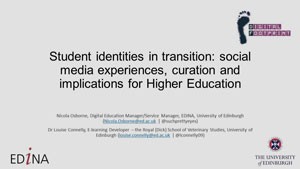 Student identities in transition: social media experiences, curation, and implications for higher education
Student identities in transition: social media experiences, curation, and implications for higher education
Nicola Osborne @suchprettyeyes and Louise Connolly @lconnelly09 – University of Edinburgh
Students increasingly arrive at university with a range of existing social media presences.
In this paper we will explore how students conceptualise and manage their online presence, and how this aligns with professional social media best practices. We will then discuss implications for teaching and learning in practice in HE organisations.
Detailed description of short paper
Audio recording of presentation
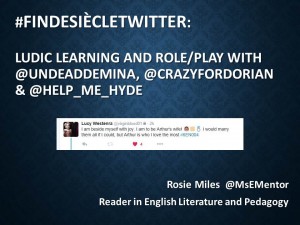 #FinDeSiècleTwitter: Ludic learning and role/play with @UndeadDeMina, @CrazyForDorian and @Help_Me_Hyde
#FinDeSiècleTwitter: Ludic learning and role/play with @UndeadDeMina, @CrazyForDorian and @Help_Me_Hyde
Rosie Miles @MsEmentor – University of Wolverhampton
This paper presents an innovative use of role-play using twitter as an example of what Kolb and Kolb term “ludic learning” (2010). The potentially changed and challenged tutor’s role, students teaching each other, issues of privacy and the encouragement of the carnivalesque are all discussed.
Detailed description of short paper
Audio recording of session
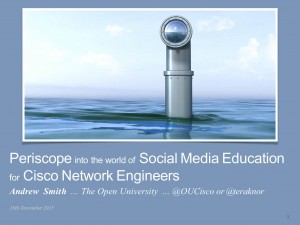 Periscope into the world of social media education for Cisco network engineers
Periscope into the world of social media education for Cisco network engineers
Andrew Smith @OUCisco – The Open University
Over the summer of 2015, the Open University Cisco Networking Academy conducted experimental teaching sessions with social media live streaming (via Periscope). Focussing on microteaching a practical skill in approximately ten minutes, these sessions have been recommenced from Oct 2015 as a weekly event. This short paper will share the outcomes of this approach.
Detailed description of short paper
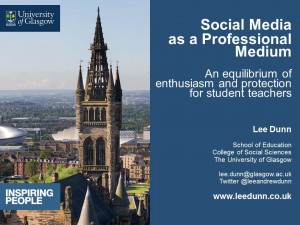 Social media as a professional medium: Achieving an equilibrium of enthusiasm and protection for new teachers
Social media as a professional medium: Achieving an equilibrium of enthusiasm and protection for new teachers
Lee Dunn @leeandrewdunn – University of Glasgow
This paper explores the use of social media within a blended mode of study. Specifically, it aims to consider the professional use of online social contexts to support teaching and encourage collaboration between learners. It will illustrate some factors intended to protect their digital identities, confidence and online well-being.
Detailed description of short paper
Audio recording of session
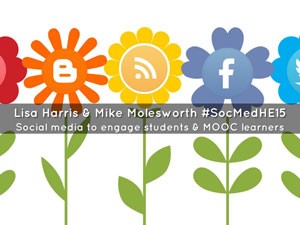
Building networks of campus-based students and MOOC learners
Lisa Harris @lisaharris and Mike Molesworth – University of Southampton
We will report on our experience with integrating an introductory campus-based module for MSc students with our MOOC in real time. The objective was to encourage our students to develop their online networks for learning and professional purposes, by sharing experiences and building relationships with a global community of MOOC learners.
Detailed description of short paper
Audio recording of presentation
The role of technology as mediating tools in developing professional identity and competency of trainee accountants
Iwi Ugiagbe-Green – Leeds Beckett University
The aim of the paper is to present findings from an empirical study which explores the mediating roles of technology during the initial professional development of trainee accountants. During this process, the trainee accountant has to demonstrate development of their professional identity and competency for assessment purposes.
Detailed description of short paper
Audio recording of presentation
We are what we tweet: developing a digital identity in 140 characters or less; a journey from silent spectator to confident tweeter
Gillian Dawson – The Library of the University of the West of Scotland @uwslib
I aim to show the process of developing an online identity using Twitter whilst growing in digital confidence and capability. I will share my experiences as part of the @uwslib team and illustrate lessons learned along the way from this continually evolving account.
Detailed description of short paper
Twitter as a curator of academic resources in the field of social sciences and humanities
Fernando Christian Hernandez Perez @bourdieu – Metropolitan Autonomous University, Azcapotzalco, Mexico City
This short paper presents a study which used a fictional identity on Twitter to reinforce traditional channels of learning and teaching by disseminating resources via this identity’s Twitter feed.
Detailed description of short paper
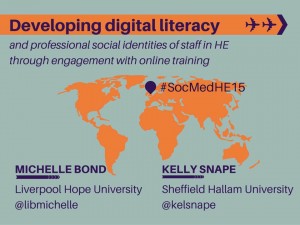 Developing the digital literacy and professional social identities of staff in Higher Education through engagement with online training
Developing the digital literacy and professional social identities of staff in Higher Education through engagement with online training
Kelly Snape @kelsnape – Sheffield Hallam University and Michelle Bond @libmichelle
– Liverpool Hope University
Developing digitally literate HE staff: an exploration of the challenges of encouraging staff to develop their own digital/social identity to equip them with the confidence to contribute to the development of the digital literacy and professional identities of students. A case study through the lens of working with careers practitioners.
Detailed description of short paper
Bridging the gap between student learning and professional identity: Using Twitter to promote engagement in education policy
Damien Fitzgerald @teacheruni and Ester Ehiyazaryan-White – Sheffield Hallam University
This paper reports on using Twitter as part of a undergraduate module focused on child and family policy. The paper presents an overview of the results and an evaluation of the potential uses of Twitter to promote learning and engage students in real world contexts to develop their professional identities.
Detailed description of short paper
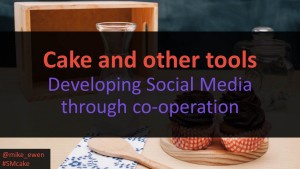 Cake and other tools – How to develop SM through co-operation
Cake and other tools – How to develop SM through co-operation
Mike Ewen @mike_ewen – University of Hull
The talk aims to provide practical advice on developing relationships at local, regional and national levels to develop a networked approach to social media.
Detailed description of short paper
Audio recording of presentation
Are you Facebooking for the future or still watching Breaking bad? – Experiencing the theory and the visual to comprehend history of the media
Hilary Cunliffe-Charlesworth @hilary_cunliffe and Joan Ramon Rodriguez-Amat – Sheffield Hallam University
Most academic subjects include topics that staff find fascinating but students do not want to learn. This paper considers how the use of social media (Facebook and Twitter) has been used to engage reluctant students and evaluates the challenges, questions and successes of using a wider range of learning tools.
Detailed description of short paper
Audio recording of presentation
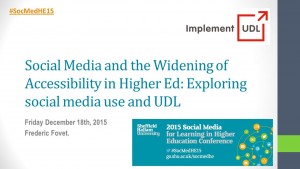 Social media and the widening of accessibility in Higher Education: Exploring social media use and Universal Design for Learning
Social media and the widening of accessibility in Higher Education: Exploring social media use and Universal Design for Learning
Frederic Fovet @FFovet – La Trobe University Australia
The session will explore the possible uses and impact of social media in the widening of accessibility in Higher Education, for Students with Disabilities. It will analyse and present data collected on a large Canadian campus over a four year drive to implement Universal Design for Learning.
Detailed description of short paper
Using Twitter to support the development of a learning community with postgraduate distance learning students
Simon Horrocks @horrocks_simon and Sheila Curran @sheilacurran1 – The Open University
This paper will explore the opportunities and challenges of introducing social media channels to support a distributed learning community. In particular, it will focus on the use of Twitter to support a global cohort of postgraduate education students at The Open University.
Detailed description of short paper
Using a collective blog to support the transition between work and formal learning in a Master’s course
Florence Dujardin @afdujardin – University of East Anglia
This paper focuses on mature learners’ digital identities. To support their transition into a learning community, a Master’s module required these students to share a reflective blog. The study examines how their writing reflects increasing abilities and highlights the role of a peer audience in emerging digital confidence.
Detailed description of short paper
Shaping ‘e’ professional identities – towards an understanding the impact of social media experiences on the professional development of social work students
Sam Miller @Samhudmiller – University of Huddersfield
The presentation draws on a small, phenomenological research project involving first year social work students at the University of Huddersfield, taking part in a focus group study and completing an on-line questionnaire. The results highlight the increasing complexity of social media experiences and its impact upon professional development.
Detailed description of short paper
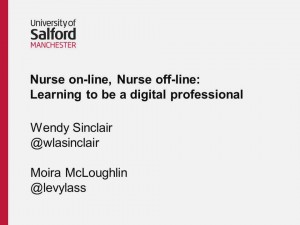 Nurse online, nurse offline – learning to be a digital professional
Nurse online, nurse offline – learning to be a digital professional
Wendy Sinclair @wlasinclair and Moira McLoughlin @levylass – University of Salford
This paper will explore how embedding social media in higher education programmes that are bound by regulatory bodies. It will explore how to ensure students can learn to use social media responsibly through role modelling and co-curation.
Detailed description of short paper
Social media portfolios: Building a professional social media profile for presentation in LinkedIn
Andrew Middleton @andrewmid, Sue Beckingham @suebecks and Kelly Snape @kelsnape
– Sheffield Hallam University
Reflecting on recent work this paper considers how social media is being used to generate evidence of learning and professional practice by students and academic staff to populate their online professional profile.
Detailed description of short paper
Audio recording of session
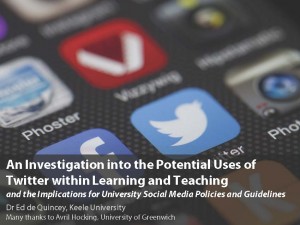 An investigation into the potential uses of Twitter within learning and teaching and the implications for university social media policies and guidelines
An investigation into the potential uses of Twitter within learning and teaching and the implications for university social media policies and guidelines
Ed de Quincey @eddequincey – Keele University
This presentation describes a study that has analysed the tweeting activity of lecturers and students. The potential benefits are discussed along with the surprise difficulty in getting students to engage with twitter. Issues regarding digital identity are considered and how they have contributed to a University social media policy.
Detailed description of short paper
Heart and mind: Student Facebook groups emphasise that learning is emotional as well as cerebral
Tony Coughlan @tjcoughlan and Leigh-Anne Perryman @laperryman – The Open University
An analysis of student-led public Facebook groups with a combined membership of 2600 students revealed widespread emotional and cerebral support plus evidence that thriving groups can assist student retention. This research helps institutions to understand the valuable role performed by Facebook groups alongside formal provision.
Detailed description of short paper
Audio recording of session
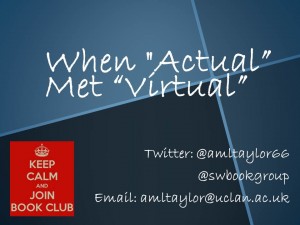 When actual met virtual – A teaching and learning methodology in social work education that through the use of technologies has grown into a national community of learning
When actual met virtual – A teaching and learning methodology in social work education that through the use of technologies has grown into a national community of learning
Amanda Taylor @AMLTaylor66 – University of Central Lancashire
The book groups in social work education methodology was originally designed to supplement traditional teaching methods in traditional spaces. However, embedding technologies within the approach has broken down the geographic boundaries that once reduced social work education into silos. This session outlines what can occur “when actual meets virtual’’.
Detailed description of short paper
Creating an ethical and sustainable social media
Christopher Hall @goldblach – Sheffield Hallam University
‘You affect the world by what you browse.’ Tim Berners-Lee – Aiming to initiate the development of a policy for the ethical and sustainable use of Social Media in Higher Education by outlining the key issues such as our role as educators and our relationship with the Social Media. The key focus is how we can engender change through action.
Detailed description of short paper
Third year students as social media consultants
Luke Regan and Chris Hall @goldblach – Sheffield Hallam University
This thunderstorm session will give an overview of an assessment task we designed to help students understand the value of their informal knowledge of social media within the job market.
Working as consultants on live briefs with real world clients, students’ engagement, standards and employability comprehension have all increased.
Detailed description of thunderstorm
Learn hacks – Using Adobe Voice to make short animated videos about social media tools that support student learning and research skills
Andrew Tattersall @Andy_Tattersall – The University of Sheffield
The focus of this Thunderstorm session is to showcase the collection of short animated videos that have been created by Andy Tattersall using Adobe Voice.
They focus on several themes including discoverability, curation, impact, collaboration and productivity. The collection of videos are hosted on iTunes U, YouTube and Vimeo.
Detailed description of thunderstorm
Presentation slides
Research Flashmobs: An online journal club using social media
Anne-Marie Borneuf @MMUPreRegNurse1 – Manchester Metropolitan University
A 10-minute opportunity to interact in a Flashmob online in a research journal club. Including setting up an online journal club and deliberating the advantages and challenges of this innovate activity.
The focus being to enhance tutors own creative teaching, learning and digital literacy skills.
Detailed description of thunderstorm
Moons, Toasters and MOOCs: Going live with Google Hangouts
Catherine Chambers @Catherine_C – The Open University
The popularity of social learning signals the potential to transform learning into a lifestyle. This presentation looks back on a series of Google Hangouts broadcast in 2014 during the Open University Moons MOOC and explores how presentation styles and formats can enhance engagement with informal learners.
Detailed description of thunderstorm
Using blogs to engage students in their subject outside of formal teaching spaces
Tom Bassindale @WeAreForensic – Sheffield Hallam University
Over the past three years I have been writing short (~500 words) blogs to supplement lecture material. I will explain how these blogs link to the lecture or to professional development through wider exposure to the subject matter. I will also show how these have expanded my learning network.
Detailed description of thunderstorm
Presentation slides
Bringing Snapchat into the lecture theatre to engage students
Dr Beryl Jones @boltew – Kingston University
The aim of the study is to demonstrate how the use of Snapchat can be used in the lecture theatre to increase engagement in the classroom between lecturer and student. The objective is an attempt to increase student retention and improve performance.
Detailed description of thunderstorm
Presentation slides
Thunderstorms
Third year students as social media consultants
Luke Regan and Chris Hall @goldblach – Sheffield Hallam University
This thunderstorm session will give an overview of an assessment task we designed to help students understand the value of their informal knowledge of social media within the job market.
Working as consultants on live briefs with real world clients, students’ engagement, standards and employability comprehension have all increased.
Detailed description of thunderstorm
Learn hacks – Using Adobe Voice to make short animated videos about social media tools that support student learning and research skills
Andrew Tattersall @Andy_Tattersall – The University of Sheffield
The focus of this Thunderstorm session is to showcase the collection of short animated videos that have been created by Andy Tattersall using Adobe Voice.
They focus on several themes including discoverability, curation, impact, collaboration and productivity. The collection of videos are hosted on iTunes U, YouTube and Vimeo.
Detailed description of thunderstorm
Presentation slides
Research Flashmobs: An online journal club using social media
Anne-Marie Borneuf @MMUPreRegNurse1 – Manchester Metropolitan University
A 10-minute opportunity to interact in a Flashmob online in a research journal club. Including setting up an online journal club and deliberating the advantages and challenges of this innovate activity.
The focus being to enhance tutors own creative teaching, learning and digital literacy skills.
Detailed description of thunderstorm
Moons, Toasters and MOOCs: Going live with Google Hangouts
Catherine Chambers @Catherine_C – The Open University
The popularity of social learning signals the potential to transform learning into a lifestyle. This presentation looks back on a series of Google Hangouts broadcast in 2014 during the Open University Moons MOOC and explores how presentation styles and formats can enhance engagement with informal learners.
Detailed description of thunderstorm
Using blogs to engage students in their subject outside of formal teaching spaces
Tom Bassindale @WeAreForensic – Sheffield Hallam University
Over the past three years I have been writing short (~500 words) blogs to supplement lecture material. I will explain how these blogs link to the lecture or to professional development through wider exposure to the subject matter. I will also show how these have expanded my learning network.
Detailed description of thunderstorm
Presentation slides
Bringing Snapchat into the lecture theatre to engage students
Dr Beryl Jones @boltew – Kingston University
The aim of the study is to demonstrate how the use of Snapchat can be used in the lecture theatre to increase engagement in the classroom between lecturer and student. The objective is an attempt to increase student retention and improve performance.
Detailed description of thunderstorm
Presentaion slides